2022 China Tax Law Forum and the 11th China Tax Lawyers and Tax Agents Forum
On December 25, 2022, co-sponsored by the All China Lawyers Association and the China Certified Tax Agents Association, and jointly organized by the Guangdong Lawyers Association, the Guangdong Certified Tax Agents Association, the Finance and Taxation Law Committee of the All China Lawyers Association, the Finance and Taxation Law Research Center of China University of Political Science and Law, and the Tax Law Professional Committee of the Guangdong Lawyers Association, and co-organized by Hwuason Law Firm, Huashui Tax Agent Firm Co., Ltd., Guangdong Branch of Grant Thornton (Beijing) Tax Agent Co., Ltd., and Beijing Huashui Education Technology Co., Ltd. "The 2022 China Tax Law Forum and the 11th China Tax Lawyers and Tax Agents Forum" was grandly held, with the theme of "Striving for a New Journey and Tax-related Service Innovation".
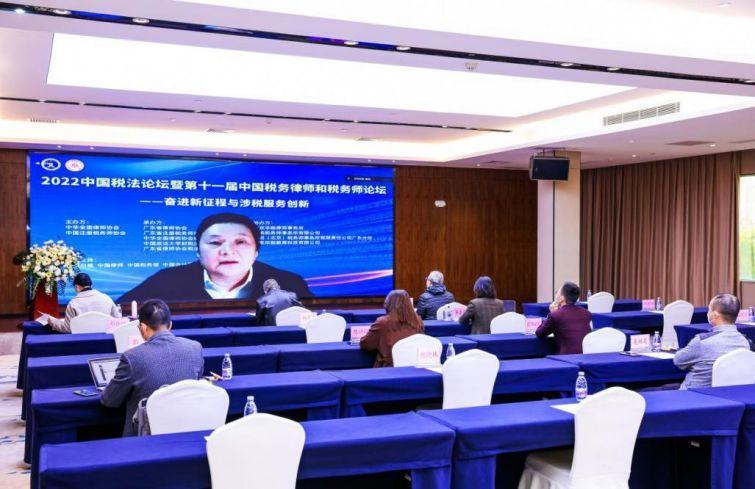
Pictured at the opening ceremony of the forum (Guangzhou venue)
At 8:30 a.m. on December 25, the opening ceremony of the forum was held. Mr. Xie Bin, Executive Vice President of China Certified Tax Agents Association, Mr. Zhang Dawei, Deputy Secretary-General of All-China Lawyers Association, Mr. Liu Jianwen, Professor and President of Finance and Taxation Law Research Association of China Law Society, Mr. Gao Feng, Vice President and Secretary-General of Guangdong Certified Tax Agents Association and Second-level Inspector of Guangdong Provincial Taxation Bureau of the State Administration of Taxation, Mr. Wu Xingyin, Vice President of Guangdong Lawyers Association and Deputy to Guangdong Provincial People's Congress, and Mr. Shi Zhengwen, Director and Professor of Finance and Taxation Law Research Center of China University of Political Science and Law, attended the opening ceremony and delivered speeches successively. Liu Tianyong, director of the Finance and Taxation Law Committee of the All China Lawyers Association and director of Hwuason Law Firm, presided over the opening ceremony.
In his speech, Vice President Xie Bin pointed out that the China Tax Law Forum is a brand and annual event for the national tax-related professional service industry, which has been successfully held for 11 sessions since 2010. At present, the China Tax Law Forum has developed into a national high-end forum focusing on theoretical research and practical discussion in the field of tax-related law, and is playing an increasingly important role in leading the high-quality development of the tax-related professional service industry and promoting the construction of tax rule of law. The 20th National Congress of the Communist Party of China (CPC), which was successfully held not long ago, has opened a new journey for China to build a modern socialist country in an all-round way and comprehensively promote the great rejuvenation of the Chinese nation with Chinese-style modernization. In accordance with the requirements of the 20th National Congress of the Communist Party of China, it is necessary to build a modern socialist country in an all-round way; it is necessary to improve the modern budget system, optimize the structure of the tax system, and intensify the regulation of taxation and social security; and it is necessary to improve the individual income tax system and standardize the order of income distribution. These new tasks and new requirements have pointed out the way forward for China's tax reform and the construction of the rule of law in taxation. As the main force of tax-related professional services, the majority of tax accountants should take the lead in conscientiously studying and implementing the spirit of the 20th National Congress of the Communist Party of China, help the construction of the national tax rule of law and tax modernization with professional services, and continuously improve the satisfaction of taxpayers, payers and tax authorities through high-quality services. Through the common exchanges and discussions of this forum, we will be able to actively promote the implementation of the legal principles of taxation, and contribute more professional wisdom to better serve the comprehensive deepening of reform, comprehensive rule of law and comprehensive opening up strategy.
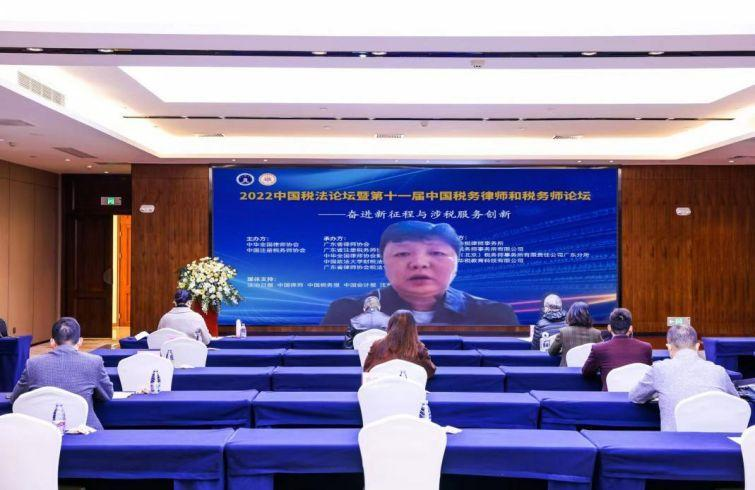
The picture shows Under-Secretary-General Zhang Dawei's speech
In his speech, Deputy Secretary-General Zhang Dawei first congratulated the convening of the 2022 China Tax Law Forum, welcomed the participants from all walks of life, and thanked the organizers and organizers of the forum for their hard work. He pointed out that since the China Tax Law Forum was first held in 2010, it has become an annual event for the national tax-related service industry. Over the past 10 years, China's tax legislation has been accelerated, and great progress has been made in implementing the statutory principles of taxation. In the past ten years, the market demand for tax legal services has been expanding, and some large law firms have taken the lead in setting up professional tax departments to adapt to the development of the situation. In 2012, the All-China Lawyers Association established a professional committee on fiscal and taxation law, and at present, the lawyers associations of most provinces (municipalities) and provincial capitals in China, including Beijing, Shanghai, Guangdong, Jiangsu and other places, have established professional committees for fiscal and taxation law or tax law research associations. The report of the 20th National Congress of the Communist Party of China pointed out the direction and provided guidance for the development of the tax lawyer industry. Under the new situation, we must establish a sense of opportunity, forward-looking and development, actively expand the field of tax-related business, innovate tax-related services, strive to improve our practice ability, and constantly adapt to the new situation, new mission and new requirements of tax reform in the new era, so as to better serve the comprehensive deepening of reform, the comprehensive governance of the country according to law, and the high-level opening up and high-quality development. It is believed that the successful holding of this China Tax Law Forum will further promote the rapid and healthy development of the tax lawyer industry, further promote the exchanges between tax lawyers and tax legislature, administrative and judicial authorities, and further make positive contributions to the modernization of the national tax governance system and governance capacity with the professionalism of tax lawyers. Finally, he wished the forum a complete success!

Pictured is President Liu Jianwen's speech
In his speech, President Liu Jianwen pointed out that despite the severe epidemic situation, everyone's dedication and enthusiasm for tax law have not diminished. In the past month, a series of forums on fiscal and tax law have been held. Today's China Tax Law Forum is mainly attended by tax lawyers and tax agents. He pointed out that everyone has a common aspiration, which is to accelerate the construction of a new development pattern, focus on promoting high-quality development, improve people's livelihood and well-being, and improve the quality of people's lives. The further development of China's fiscal and taxation rule of law is the mission of a generation of fiscal and taxation legal persons. Through the holding of this forum, we can further implement the spirit of the 20th National Congress of the Communist Party of China, deepen the exchanges and sparks of ideas among the experts, scholars and practitioners here, and hope that everyone can discuss what is high-quality tax law services, as well as the standards, products and market expansion of high-quality tax law services.
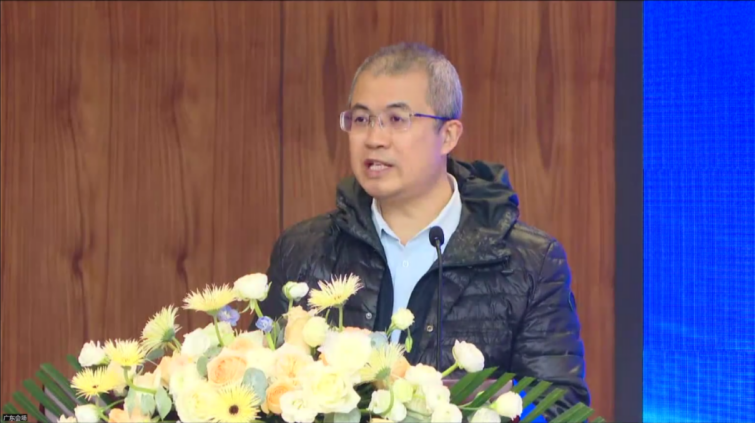
Mr. Ge Hailin, Under-Secretary-General, delivered a speech on his behalf
Entrusted by Mr. Gao Feng, Vice President and Secretary-General of Guangdong Certified Tax Agents Association, Ge Hailin, Deputy Secretary-General of Guangdong Certified Tax Agents Association, delivered a speech at the offline venue in Guangdong, in which he pointed out that since the 20th National Congress of the Communist Party of China, the General Secretary has put forward two primary tasks, one is to study, publicize and implement the spirit of the 20th National Congress, and the other is high-quality development. Today's forum organized by the two major associations is obviously a concrete action to implement the two tasks from two dimensions, so it is very timely, very necessary, and very important. The forum focused on the themes of optimizing the tax structure and implementing the statutory principles of taxation, the compliance construction of enterprises involved in the case and the innovation of tax-related services, which reflected the new development concept of the rule of law and the requirements of promoting tax modernization. At the same time, this forum has gathered authoritative experts and academic leaders in the field of tax law theory and practice across the country, which will surely be a feast for the exchange of ideas and wisdom, and will surely produce surprising and fruitful results.
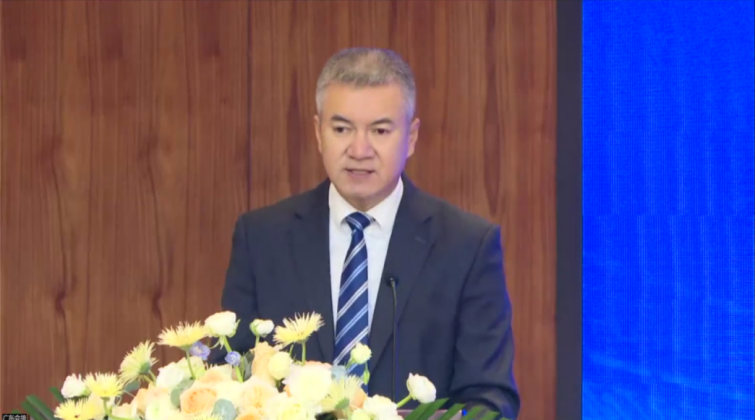
The picture shows Vice President Wu Xingyin's speech
Vice President Wu Xingyin pointed out in his speech that the 20th National Congress of the Communist Party of China was successfully held not long ago, and in this context, the reform of China's fiscal and taxation system has also ushered in new development opportunities. On the one hand, with the rapid advancement of China's rule of law, the progress of tax legislation is also significantly accelerated, and the tax legislation of various types of taxes is also constantly advancing. On the other hand, with the advancement of the reform of the national tax collection and management system, major changes have taken place in tax collection and management, and the improvement from empirical tax management to ticket control tax to digital tax governance has been realized, and China's tax collection and management has entered a new stage of digital upgrading and intelligent transformation. This brings a once-in-a-lifetime opportunity for tax lawyers and tax accountants to develop their businesses. The successful holding of this forum will further promote the win-win cooperation between China's tax lawyers and tax agents, better innovate tax-related services, and promote the reform of China's fiscal and taxation system into a new journey.
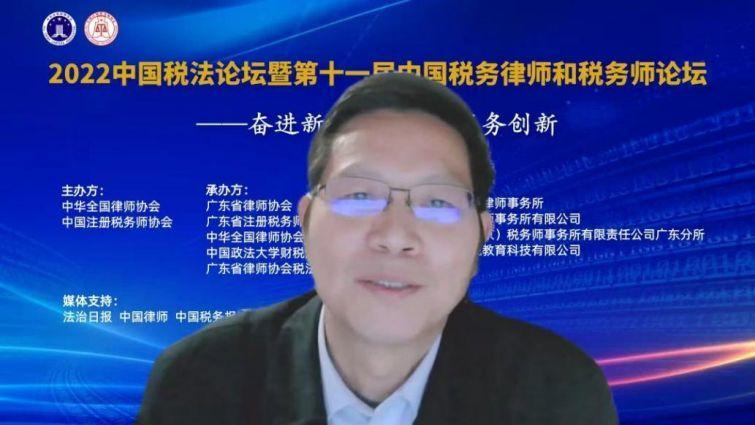
The picture shows Prof. Shi Zhengwen's speech
In his speech, Professor Shi Zhengwen pointed out that with the development of modern civilization and modern society, everyone has become more and more aware of the core and basic role of finance and taxation. The fiscal and taxation law is not only the foundation of a country's economic development, but also the guarantee of a country's rule of law, democratic construction, and social progress. He introduced the importance and basic mode of the compilation of the tax code, he believes that the compilation of the tax code must play the leading role of the general provisions of the tax law, the rule of law of taxation as a systematic project, in addition to high-quality legislation, more important is the implementation of the law, the compilation of the tax code will be for the application of the tax law, the interpretation of the tax law to achieve systematic integration, make up for the loopholes in the law, and greatly promote the improvement of the level of implementation of our law. He believes that China's future tax code should adopt the legislative model of general provisions plus points, and at the same time, it should be appropriately codified. He looks forward to a tax code by 2035 as a symbol of our country's basic modernization, and he hopes that everyone can participate in such a great legislative practice and contribute our wisdom together.
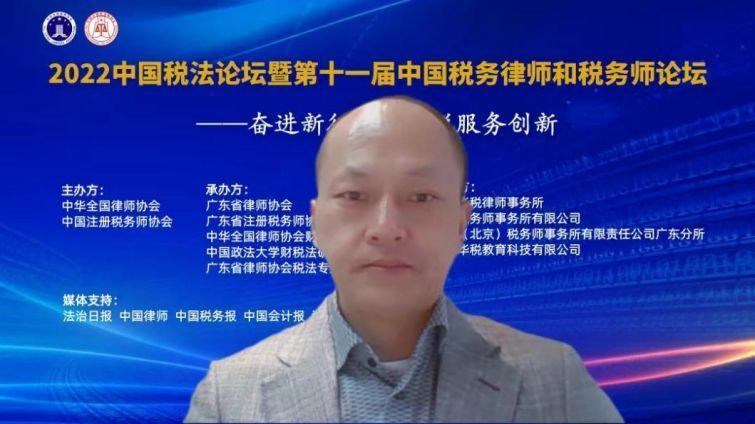
Pictured is Director Liu Tianyong presiding over the opening ceremony
After the opening ceremony, the theme session of the forum officially began. This year's forum includes four themes, namely: (1) optimizing the tax structure and implementing the statutory principles of taxation, (2) compliance construction and tax-related service innovation of enterprises involved in cases, (3) tax governance and tax-related service upgrading with numbers, and (4) digital economy, "Belt and Road" tax collection and management cooperation mechanism and international tax-related services.
The first part of the theme was "Optimizing the Tax Structure and Implementing the Statutory Principles of Taxation", which was chaired by Mr. Wang Zhaohui, Deputy Director and Secretary-General of the Finance and Taxation Law Committee of the All China Lawyers Association and Senior Partner of Beijing Jincheng Tongda & Neal Law Firm. Ms. Feng Qiaobin, Deputy Director of the Macro Department of the Development Research Center of the State Council and Deputy Secretary-General of the China Fiscal Society, Mr. Yang Xiaoqiang, Professor and Doctoral Supervisor of the Law School of Sun Yat-sen University, and Mr. Li Linjun, Vice President of the China Certified Tax Agents Association and former Director of the Department of Taxation of the State Administration of Taxation, delivered keynote speeches respectively.

The picture shows Vice Minister Feng Qiaobin speaking
Vice Minister Feng Qiaobin's speech was on the theme of "High-quality Development and the Current Deepening of Tax Reform". First of all, combined with the report of the 20th National Congress of the Communist Party of China, she proposed that high-quality development is the primary task of building a modern socialist country in an all-round way, and it is also the main starting point for the central task of realizing Chinese-style modernization. Then, she summarized the four major tasks of high-quality development, one is to build a modern industrial system, the second is to comprehensively promote rural revitalization, the third is to promote regional coordinated development, and the fourth is to promote high-level opening up. She believes that the four main lines and contexts of high-quality development are closely related to our tax reform. Taxation must be closely aligned with high-quality development, and in the final analysis, it is to deepen tax reform around the two main lines of digital transformation and green development. Then, she analyzed the direction of tax reform under the digital economy: first, the digital economy has changed the distribution of the tax base, taking the circulation tax system as an example, it is necessary to shift from value-added tax to sales tax to adapt to the development of industrial integration; the tax base has changed from value-added to total value; the tax rate has changed from lower to lower; second, the number of natural person taxpayers has increased greatly, and the income tax system needs to consider the development of the platform economy and increase the special platform income tax. In terms of individual income tax, it is necessary to play a major role in regulating income distribution, including the comprehensive integration of taxable income, the further increase of the tax threshold, and the maintenance of a high level of the maximum marginal tax rate. Third, in terms of tax collection and management, it is necessary for the platform to share and coordinate with the government. Finally, she introduced the adjustment of fiscal and tax policies under the background of carbon peaking and carbon neutrality, and she believes that the current tax policy is difficult to show the regulatory effect on the use of energy, especially fossil energy, and should introduce a carbon tax in a timely manner, and the more appropriate plan is to add a new "greenhouse gas" tax item under the environmental protection tax.
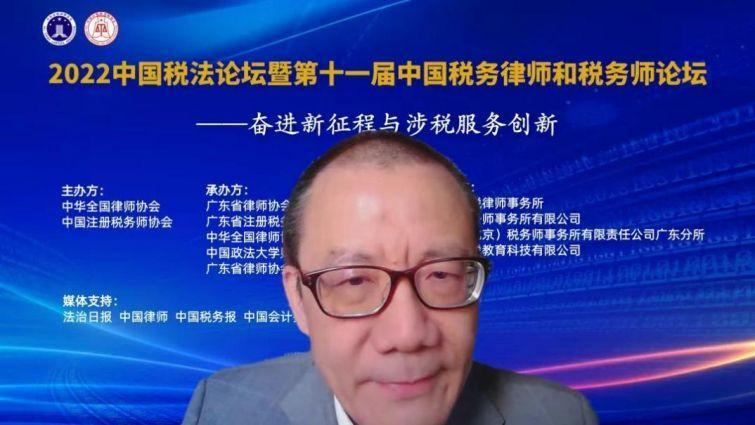
The picture shows Professor Yang Xiaoqiang giving a speech
Professor Yang Xiaoqiang's speech was entitled "Legislative Progress and Hot Issues of the VAT Law", and he first introduced the latest legislative developments of the VAT Law, pointing out that the Customs Law and the VAT Law have been included in the State Council's 2022 legislative work plan. From the 27th to the 30th of this month, the 38th meeting of the Standing Committee of the 13th National People's Congress will deliberate on the draft VAT law. Then, he reviewed the evolution of VAT legislation, pointing out that China's VAT legislation has been a gradual legislative process since 1979, from the 2019 draft for comments, the 2020 draft for review, and the 2022 draft for deliberation. Then, he discussed six hot issues in legislation: First, is the time for China's value-added tax legislation already available? He proposed that value-added tax is a transaction tax, and at present, China's "Civil Code" has come into effect, and the civil legal relationship has been stabilized, and value-added tax legislation can begin. He pointed out that the principle of neutrality is the foundation of VAT, and the long-term goal of VAT is to uphold the principle of neutrality. However, in the current process of VAT reform, regulatory policies such as tax cuts and fee reductions can be implemented conditionally. Third, how to define taxable behaviors and taxable transactions? He pointed out that China's value-added tax (VAT) adopts an enumerative definition of taxable behavior, which has led to many controversies in reality, and it is necessary to carry out the highest theoretical abstraction of the definition of taxable behavior. He pointed out that financial services are tax-free in many countries, and that after China's "business tax reform," financial services will be taxed at 6 percent, but there are many problems in the practice of tax collection and management. First, there is no clear definition of financial products, and secondly, there is controversy about whether many behaviors belong to financial services, which needs to be further clarified by legislation. Fifth, value-added tax in the digital age. He pointed out that the European Union published a draft proposal on the digital economy VAT directive on December 8, mainly to solve the problem of tax evasion in the digital economy, four of which are worthy of reference in China - the presumption of VAT taxpayers, the introduction of electronic invoices, the implementation of electronic declaration, and the implementation of a single VAT registration. Sixth, clarify the relationship between tax rebates and export tax rebates. He pointed out that at present, most developed countries adopt the system of instant tax refund, and the tax rebate for retained credits and export tax rebates are operated in a set of systems.
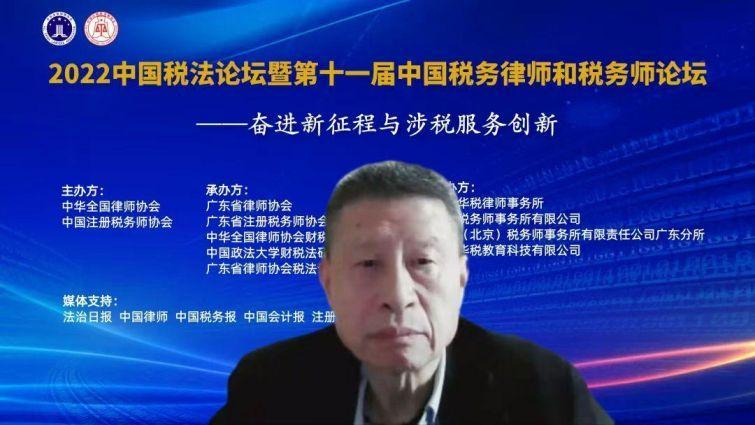
The picture shows Vice President Li Linjun's speech
Vice President Li Linjun's speech was on the theme of "Digital Transformation and Tax-related Professional Service Innovation", and he first pointed out that the digital economy has become the main form of the entire economy, and the tax collection and management under the digital economy has undergone a major change. Then, he analyzed the opinions of the two offices and the implementation measures of the State Administration of Taxation, and put forward five key tasks: one is to insist on comprehensively promoting the digital upgrading and intelligent transformation of tax collection and management, the second is to continuously improve the tax law enforcement system and mechanism, the third is to vigorously promote high-quality, efficient and intelligent tax services, the fourth is to accurately implement tax supervision, and the fifth is to continue to deepen and expand the pattern of tax co-governance. The important measures taken by the State Administration of Taxation to implement the opinions of the two offices include: (1) comprehensively promoting the digital upgrading and intelligent transformation of tax collection and management. (2) Construction of the fourth phase of the Golden Tax. (3) Deepen the application of tax big data. (4) Continue to deepen and expand the pattern of tax co-governance. Finally, he looked forward to the direction and path of digital innovation of tax-related services, first, the development of traditional offline and manual services to online and offline integrated services. The second is the development of general tax consulting and agency declaration business to "specialized, special and new" and high-end consulting. Third, the tax-related services of large enterprises have developed from traditional manual tax consulting and planning to productization (software). Fourth, the tax-related services of small, medium and micro enterprises are developing on a platform.
After the keynote speech, Mr. Zhang Fuqiang, Vice President of the Finance and Taxation Law Research Association of China Law Society and Professor of the Law School of South China University of Technology, Ms. Ye Shan, Professor of Peking University Law School and Director of the Tax Law Research Center of Peking University, and Mr. Lu Zhihe, Deputy Director of the Tax Law Professional Committee of Guangdong Lawyers Association and Partner of Kangda Law Firm, made comments.
The second part of the session was titled "Compliance Building and Innovation of Tax-related Services for Enterprises Involved in Cases", which was hosted by Ms. Ma Xiaoyan, Director of the Tax Law Committee of Guangdong Lawyers Association and Senior Partner of Guangdong Guangyue Law Firm. Mr. Liu Tianyong, Director of Tax Law Committee of All China Lawyers Association and Director of Beijing Hwuason Law Firm, Mr. Wang Jiaben, Legal Advisor of State Administration of Taxation (SAT) and Senior Partner of Beijing Tianchi & Juntai Law Firm, and Mr. Yuan Sengeng, Senior Partner of Beijing Pacific Century Group (Haikou) Law Firm and Professor of Taxation Cadre College of the State Administration of Taxation (SAT), delivered the keynote speeches respectively.
Mr. Liu Tianyong's speech was titled "Latest Corporate Tax Compliance Practices and Cases". First of all, he introduced the connotation and extension of tax compliance as well as the new progress of tax-related criminal compliance. He pointed out that tax compliance mainly refers to tax-related criminal compliance and corporate tax administrative compliance. The Supreme Prosecutor started the first phase of corporate compliance reform pilot work since March 2020, and in April 2021, officially launched the second phase of corporate compliance reform pilot work, releasing two batches of typical cases of corporate compliance reform pilot work. According to the relevant disclosed data, about 1/3 of the total number of cases involved in corporate compliance reform in 2021 were in the category of fraudulent invoicing, and the recent data on corporate compliance cases released by the Beijing Haidian District People's Procuratorate showed that tax-related crimes were as high as 66.67%. After the full rollout of criminal compliance reform, the total number of corporate compliance cases nationwide accumulated 3,218 by the end of August 2022, an increase of 2,229 cases in 4 months compared to the end of April 2022, and he estimated about 1,000 cases of false invoicing compliance and 2,000 cases of tax-related compliance. In the second part, he focused on sharing the professional services that tax-related professionals can provide in criminal compliance cases, mainly including criminal defense, compliance counseling, implementation of inspection and assessment, and participation in the research and development of corporate compliance inspection standards. In the third part, he introduced the realization path of corporate tax administrative compliance, focusing on petrochemical, renewable resources, real estate, coal, medicine, finance, foreign trade and other industries represented by Huatax, and hinted at high tax-related risk behaviors such as change of invoice, over-invoice, surplus invoice, false enhancement of items, dependence, financial return, and double-heading. Finally, he shared the three latest tax administrative compliance cases represented by Huatax and gave an outlook on corporate tax administrative compliance. For the prior prevention of controllable tax-related risks, he shared a case of compliance and rectification of an internet transportation platform enterprise, suggesting that the enterprise collects multifaceted evidences in the process of conducting business to corroborate the authenticity of the business, which effectively realizes the isolation of the risk of false opening. On the other hand, for the post-event response to uncontrollable tax-related risks, he firstly shared a controversial case of an iron and steel enterprise obtaining invoices that were recognized as false opening. He suggested that the Notice of Confirmed False Invoicing can only be used as a clue for filing an investigation, and if the tax authorities make a decision on tax treatment or penalty without carrying out a full investigation and obtaining complete evidence, then it is a case of finding the facts to be unclear and the evidence to be insufficient. Another case is the land value-added tax dispute on land resumption. He believed that "recovery" and "transfer" are two different legal concepts, and the tax law has never stipulated that land value-added tax should be levied on the recovery of land, and enterprises can safeguard their legitimate rights and interests through administrative reconsideration, administrative litigation and other legal remedies. Finally, he suggested that enterprises' tax compliance construction should be aligned with common and individualized tax risks to realize timely prevention, response, management and disposal of tax risks. At the same time, it is also necessary to promote the synergy of legislation, justice, law enforcement and compliance, only scientific legislation, fair justice, high-quality law enforcement and corporate tax compliance can form a big pattern of good tax law and good governance.

The picture shows the speech of Mr. Wang Jiaben
Mr. Wang Jiaben's speech was titled "Analysis of the Latest Typical Cases of Tax Administrative Disputes", and he focused on a case in which Sun Moumou, an employee of a catering management company, took advantage of his position and falsely issued VAT invoices to those who did not have meals in the company, and the Inspection Bureau of the Taxation Bureau imposed an administrative penalty on the catering company. The catering company appealed and filed an administrative lawsuit. In response to the court's judgment, he put forward the following arguments: (i) The object of the administrative penalty was not inappropriate. The constitutive elements of the crime of false invoicing and the violation of false invoicing are not the same, and whether the plaintiff's employees violated the law for personal reasons did not affect the tax authorities to impose penalties on the invoicing unit. (ii) according to the false invoicing penalty in accordance with the regulations. The Plaintiff and the outsider issued a large number of ordinary VAT invoices to the outsider without any real transaction, which belonged to the behavior of false invoicing. Finally, he analyzed the following two issues in connection with this case: firstly, it is necessary to clarify the subject object of invoice management by tax authorities. Secondly, as to the viewpoint of no subjective fault put forward by the party concerned, he believed that Article 33 of the Administrative Penalty Law should be understood from three aspects: firstly, the subjective fault exists when the party concerned carries out the illegal act; secondly, the subjective fault should include both intentional and negligent states; and thirdly, in the case where the illegal act of the party concerned exists objectively, the burden of proof as to whether the fault exists in the party concerned subjectively should be borne by the party concerned.
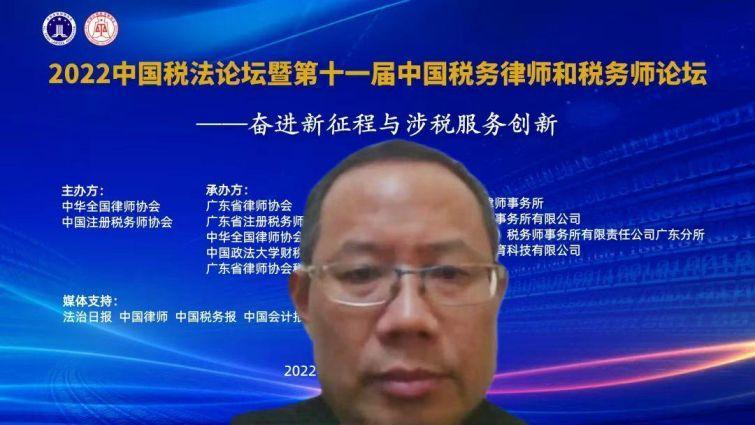
The picture shows the speech of Mr. Yuan Senggeng
Mr. Yuan Sengeng's speech was titled "Development Trend and Difficult Issues of 'False Invoicing' Criminal Cases", in which he firstly analyzed the five major development trends of false invoicing criminal cases. Firstly, with the increase of the state's crackdown on false invoicing and the advancement of advanced collection and management means such as all-electric invoices, the criminal cases of false invoicing may show a downward trend. Second, the standards and scope of identification of criminal cases of false invoicing may be partially adjusted. For example, acceptance of false invoicing is essentially a tax evasion behavior and should not be treated as false invoicing. Third, the handling of criminal cases of false opening will be coordinated by various departments, the current tax authorities and the judicial organs of many issues are not coordinated, the most typical is the act of opening on behalf of the criminal trial trend is not qualitative false opening, but the tax authorities will also be recognized as false opening. Fourth, the prosecution standard of criminal cases of false opening may also be raised. Fifth, the proportion of criminal compliance cases of false opening will be increased. Finally, he explained three difficult issues in dealing with criminal cases of false opening. The first is how to define the behavior of false VAT invoicing. For example, whether folio and ring billing are recognized as false invoicing, whether substitute billing is recognized as false invoicing, whether false name billing is recognized as false invoicing, and the boundary between false invoicing and purchase invoicing. Secondly, it is analyzed from the perspective of administrative crime, and the standard of administrative and criminal defalcation needs to be unified. From the viewpoint of the theory of constituent elements, administrative and criminal false invoicing should be consistent in terms of the determination of subjective intent and the performance of specific behaviors. Thirdly, the determination of false VAT invoices and the determination of false ordinary VAT invoices need to be unified. The criminalization of the crime of false invoicing pays more attention to the result of tax loss, while the criminalization of the crime of false invoicing does not take the result into consideration, and there may be the unreasonable consequence that the same amount of false invoicing, false invoicing of special invoices is not determined to be a crime, but false invoicing of general invoices is determined to be a crime.
After the keynote speech, Mr. Zhou Xuzhong, Secretary General of the Research Society of Finance and Taxation Law of China Law Society and Professor of Law School of Capital University of Economics and Business, Mr. Chen Bin, Deputy Director of the Professional Committee of Finance and Taxation Law of All-China Lawyers' Association and Senior Partner of Beijing Pacific Century Law Firm, and Mr. Zheng Weinan, Deputy Director of the Professional Committee of Finance and Taxation Law of All-China Lawyers' Association and Partner of Investec Law Firm, made a comment.
The third part, titled "Taxation by Numbers and Upgrading Tax-related Services", was moderated by Ms. Hao Dongjie, Editor of Taxation Research, and Ms. Wu Xiaohong, Director of the Research Center for Modern Fiscal Governance of Hefei College, Professor, and Lawyer of Anhui Tianhe Law Firm. Mr. Cai Chang, Professor and Doctoral Director of School of Finance and Taxation of Central University of Finance and Economics, Director of Tax Planning and Law Research Center, and Mr. Xu Zhancheng, Public Lawyer of Regulations Department of Zhejiang Taxation Bureau of State Administration of Taxation, delivered keynote speeches respectively.
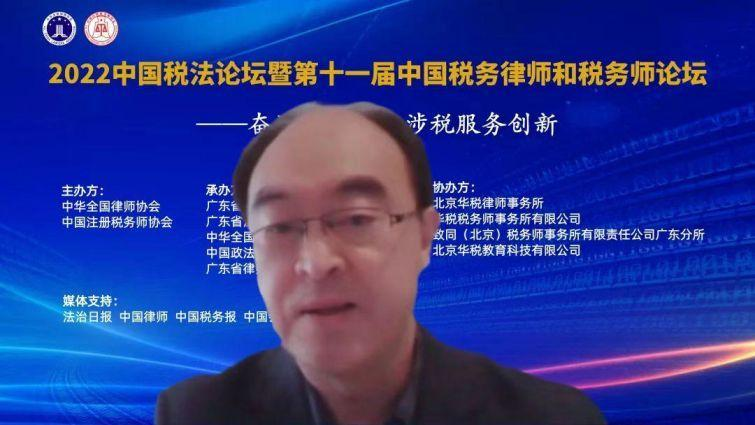
The picture shows Prof. Cai Chang's speech
Prof. Cai Chang's speech was titled "Enterprise Tax Planning Practice under the Background of Tax Reform of Hainan Free Trade Port". First of all, he introduced the tax reform of Hainan Free Trade Port, he pointed out that the free trade port is a special economic function area with the highest level of openness in the world, and the free trade port has four typical features, one is "inside the territory, outside the customs", the second is "liberalization of the first line, the second line of safe and efficient control", the third is the free flow of people, goods, data and capital and other factors, and the fourth is zero tariff, data and capital and other factors. The third is the free flow of elements such as people, goods, data and capital, and the fourth is zero tariff, low tax rate and simple tax system. Then, he made an interpretation of the tax policy of Hainan Free Trade Port. The overall program for the construction of Hainan Free Trade Port requires that under the premise of guarding the bottom line of no systemic risk, the institutional system of Hainan Free Trade Port should be constructed in accordance with the idea of "one focus, two supports and three guarantees", and the system should be implemented in accordance with the design principles of "zero tariffs, low tax rates, simple tax system, strong rule of law, and phase-by-phase". According to the design principle of "zero tariff, low tax rate, simple tax system, strong rule of law, and phased", a tax system compatible with a high-level free trade harbor will be gradually established. Finally, he hinted at the concerns of tax planning for Hainan FTTP enterprises. First, pay attention to the conditions applicable to the low corporate income tax rate of 15%, and understand the criteria for substantial operations and encouraged industries; second, pay attention to the conditions for enjoying partial exemption of personal income tax for high-end talents and talents in short supply. Thirdly, he interpreted the framework of sales tax system of Hainan FTTP, and he pointed out that the sales tax really reduces the tax burden of intermediate links, and enterprises can go to FTTP for industrial chain layout. Fourthly, he paid attention to the zero tariff policy and related supporting policies.
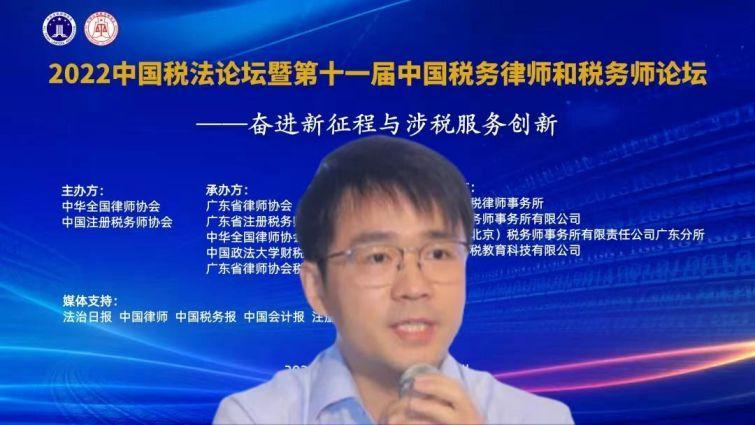
The picture shows the speech of Mr. Xu Zhaocheng
Mr. Xu Zhaocheng's speech was titled "Analysis of Hot Cases of Tax-Related Enterprise Bankruptcy Reorganization". The first hot issue he shared was whether non-monetary assets can be used to offset tax debts in reorganization. He pointed out that with the unanimous agreement of the creditors' meeting, the bankrupt enterprise can offset its debts with non-monetary assets, but there are some disputes when it comes to tax debts. Then he shared three cases of bankrupt enterprises offsetting tax debts with non-monetary assets and proposed that there are two major obstacles to offsetting tax claims with non-monetary assets: firstly, there is no mechanism of more-refund-less-compensation in bankruptcy reorganization, and after the tax authorities dispose of the assets, the portion that is insufficient to satisfy the tax claims can not be continued to be recovered, which results in the loss of the national tax interests. Secondly, the disposal capacity of tax authorities is limited and many assets cannot be disposed. Finally, he analyzed five major issues to be considered for non-monetary assets to settle tax claims. Firstly, the issue of valuation, the value of assets is constantly changing, and it is necessary to clarify how to determine the value of assets to settle debts. Second, the holding problem, in some cases there are enterprises to operating real estate and other assets against tax debts, the tax authorities to obtain the assets do not have the energy to operate, and can not be regarded as the tax has been in the Treasury. Third, the taxable issue, in the asset debt service link itself will also generate tax obligations, need to consider how this part of the tax obligation to settle. Fourth, the repair problem, after the asset debt repayment, the asset can not directly into the national treasury, in this case can not be regarded as the tax into the treasury, also can not be made tax credit repair. Fifth, the problem of write-off, before the assets are realized into the treasury, the tax arrears can not be written off, after the assets are realized into the treasury, due to the depreciation of the assets, the tax arrears have not been fully settled part of the write-off is even more unable to write off.
After the keynote speech, Mr. Cai Ming, Deputy Director of Finance and Taxation Law Committee of All China Lawyers' Association and Senior Partner of Guohao Law Firm (Nanchang), Mr. Li Shuqu, Deputy Director of Finance and Taxation Law Committee of All China Lawyers' Association and Director of Beijing Pacific Century Law Firm (Zhengzhou), and Mr. Tang Gaoxiang, Deputy Director of Taxation Law Committee of Guangdong Provincial Lawyers' Association and Senior Partner of Beijing Weiheng Law Firm, made comments respectively. Mr. Tang Gaoxiang, Deputy Director of Tax Law Committee of Guangdong Lawyers Association and Senior Partner of Beijing Weiheng (Guangzhou) Law Firm, made comments.
The fourth part of the session was titled "Digital Economy, 'Belt and Road' Tax Collection and Management Cooperation Mechanism and International Tax-related Services", which was moderated by Ms. Wu Jinmei, Deputy Director of the Professional Committee of Tax Law of Beijing Lawyers Association and Partner of Beijing Yingke Law Firm. Ms. Cui Xiaojing, Professor and Doctoral Director of Wuhan University Law School, Director of International Tax Law Research Center, Ms. Gan Xiaoyue, Director of Zhitong (Beijing) Taxation Firm, Guangdong Branch, and Ms. Shen Yinghua, Tax Partner of Ernst & Young, delivered keynote speeches respectively.
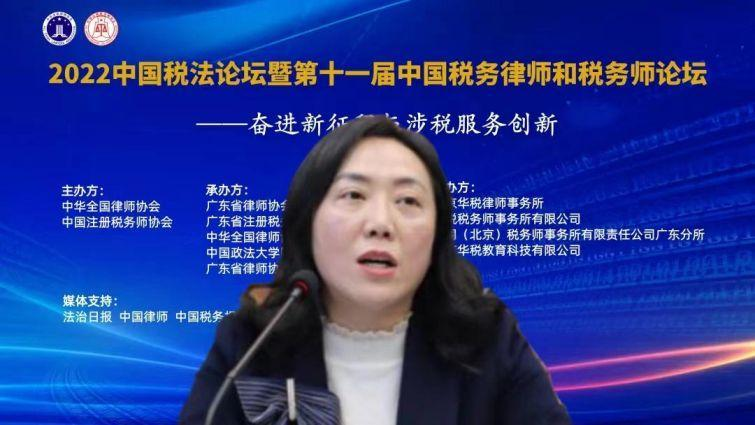
The picture shows Prof. Cui Xiaojing's speech
Prof. Cui Xiaojing's speech was titled "Challenges and Responses of Global Minimum Tax Reform on Chinese Enterprises' Outbound Investments", and she shared her views from four aspects. First of all, she introduced the background of the global minimum tax reform and the innovation of the rules, and proposed that OECD has successively issued the "Statement on the Twin-Pillar Approach to Addressing the Tax Challenges of Economic Digitization", the "Legislative Template for Pillar II Global Anti-base Erosion Rules", and the Safe Harbor Guidelines for the Implementation Framework of Pillar II GloBE, which basically constitute the main content of Pillar II. She pointed out that the GloBE rules framework is divided into four main areas, namely, the Income Inclusion Rule (IIR), the Undertaxed Payment Rule (UTPR), the Subject To Tax Rule (STTR), the Qualified Domestic Minimum Complementary Tax (QDMT), and the Qualified Domestic Minimum Complementary Tax (QDMCT). Qualified Domestic Minimum Top-up Tax (QDMT). She then shared the latest development of the Global Minimum Tax Reform (GMTR) and discussed the impact of GMTR on Chinese enterprises' offshore investments: First, for Chinese enterprises investing in the United States, there are many differences between the U.S. GILTI tax system and the Pillar II rules, which enterprises need to pay attention to. Secondly, for Chinese enterprises investing in Europe, it is recommended to assess and map the actual tax burden in Europe and make tax and business responses as soon as possible in 2023. Thirdly, for Chinese enterprises investing in Belt and Road countries and regions, the minimum tax reform will challenge the tax relief credit, and it is recommended that the tax deemed to have been paid should be added back to the numerator when calculating the effective GLoBE tax rate. Fourthly, for foreign-funded enterprises, she suggested that the basic stance that domestic tax sources should be taxed to the fullest extent possible should be adhered to, the QDMTT rules should be constructed to fully guarantee tax support for foreign investors, and tax incentives should be rationally adjusted to shift tax incentives to non-tax areas and to choose other fiscal policies.
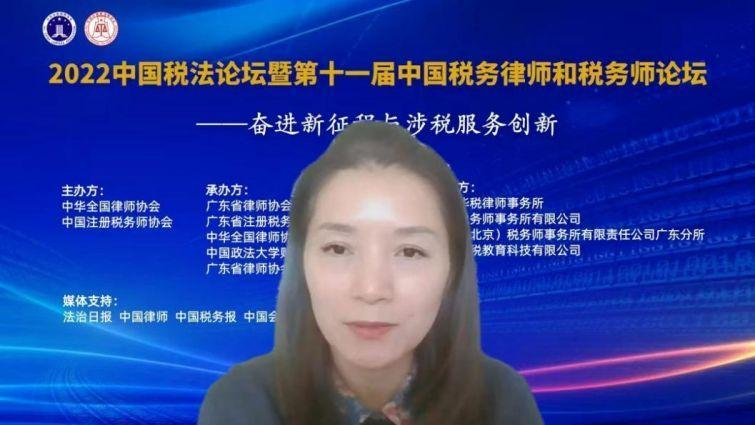
Pictured is Director Gan Xiaoyue's speech
Director Gan Xiaoyue's speech was entitled "Hot Issues of Tax-Related Services in 'Belt and Road'", and she focused on three hot issues. The first one is the double taxation of income tax, and the main ways to deal with it are to fully enjoy the benefits of the agreement and apply for tax credits (directly or indirectly) when filing domestic tax returns. Secondly, transfer pricing, she believes that the main ways to deal with it are to comply with the principle of independent business transactions, pay attention to the compliance requirements of transfer pricing, and apply for bilateral or unilateral reservation pricing arrangements. Third is the issue of permanent establishment. She suggested that the identification of permanent establishment, the principle of taxation, and the calculation of tax amount are all very complicated. Once a certain labor service is identified as constituting a permanent establishment in another country, in addition to the additional tax burden, enterprises also need to spend a lot of time and energy to deal with the issue of offshore tax declaration. Finally, she suggested several risk points: (1) some "Belt and Road" countries have not yet signed tax agreements with China, and some of the agreements are outdated and have not been updated; (2) the grassroots levy management departments do not understand cross-border tax issues, which leads to obstacles in applying for preferential treatment under tax agreements, tax concessions and credits, and issuing resident taxpayer identification; (3) the "Belt and Road" countries have not yet signed tax agreements with China. (c) Enterprises going abroad do not pay enough attention to tax issues and often pay attention to them only after risks have occurred.

Photo shows Ms. Shen Yinghua speaking
Ms. Shen Yinghua's speech was titled "Hot Issues of VAT-related Services in Cross-border Transactions", in which she firstly shared typical VAT cross-border transactions and three related hot issues: firstly, the VAT issues of B2B and B2C imported services. She pointed out that there are certain controversies in practice on how to judge that the services occur entirely outside the country and the intangible assets are entirely used outside the country. Secondly, the VAT collection and management of B2B and B2C imported goods/items, such as whether there are better tax solutions for traditional import modes, cross-border e-commerce, and purchasing on behalf of the buyer/seafarers, and how to reduce the collection and compliance costs, which are issues to be considered in the tax reform. Thirdly, the VAT issue of B2B and B2C export services. She suggested that there are differences between the determination principles of taxable, exempted and zero-rated services in China and those in the international arena, in particular, the conditions for zero-rating are more stringent. It is suggested that we can refer to the legislative content of Singapore and other countries to have a clear definition of the degree of relationship between services and goods, intangible assets and real estate. Then, she shared that cross-border VAT under the digitalization of the economy faces three major challenges, one is the challenge of VAT on B2B imported services, the other is the challenge of VAT on B2C imported services, and the third is the challenge of VAT on B2C low-value goods. She suggested reforming the cross-border VAT system by taking into account the latest international regulatory developments and OECD's recommendations. Finally, she provided an outlook on the cross-border VAT system, discussed the roles of platforms and payment intermediaries in VAT collection and management, and suggested the introduction of anti-avoidance measures such as separate payment mechanisms and the collection and exchange of transaction data.
After the keynote speech, Ms. Sun Hongmei, Director of the International Department of the Institute of Taxation Science of the State Administration of Taxation (SAT), Mr. Zhu Yansheng, Professor of the Law School of Xiamen University, and Ms. Lu Yi, Deputy Director of the Professional Committee of Finance and Taxation Law of the All China Lawyers' Association (ACLA), and Partner of Beijing Guofeng (Shanghai) Law Firm, made comments.
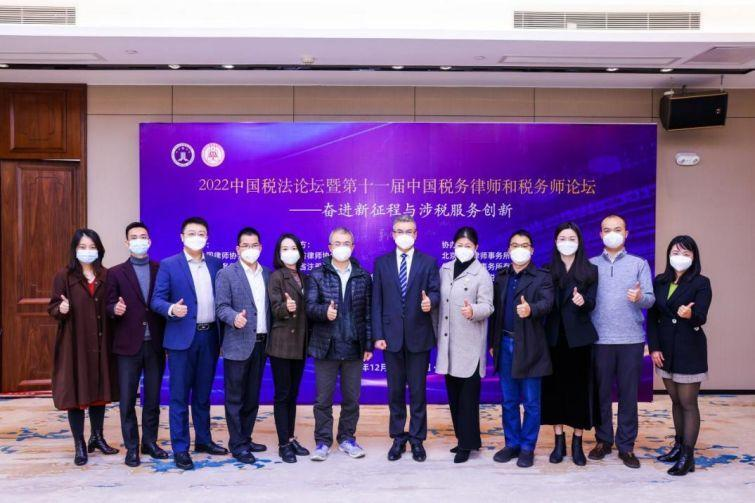
Pictured is the site of the conference in Guangzhou
The closing ceremony of this forum was held at 16:40. It was presided over by Wei Zhibiao, deputy director of the Finance and Taxation Law Committee of Beijing Lawyers Association and partner lawyer of Beijing Hwuason Law Firm. Li Linjun, vice president of China Association of Registered Tax Practitioners, and Shi Zhengwen, professor and director of the Research Center of Finance and Taxation Law of China University of Political Science and Law, delivered speeches on behalf of the host and organizer respectively.
On behalf of the organizer, Vice President Li Linjun expressed his gratitude to all the participants in the speech, pointing out that the forum brought together tax officials, tax law scholars, tax lawyers, tax accountants and corporate tax officials to exchange ideas and talk about the reform of the fiscal and taxation legal system, and that the level of social attention and participation had reached an unprecedented level. The speeches of the experts of this forum were brilliant and thought-provoking. Finally, he hoped that the majority of tax accountants would take a more open mind to further strengthen the communication and cooperation with lawyers and CPAs, actively innovate and upgrade the business field of tax-related services, so as to adapt to the new situation, new mission and new requirements of the tax reform in the new era and better serve the strategy of comprehensively deepening reform, comprehensively ruling the country according to law and comprehensively opening up to the outside world.
Director Shi Zhengwen pointed out in his speech that the forum was memorable and successful. China Tax Law Forum focuses on the current and future cutting-edge and major issues in fiscal reform, legislation and tax-related professional services. He believed that the reason why China Tax Law Forum was recognized by industry practitioners and highly evaluated by the society lies in the vision and concept of the forum, which not only focuses on the issues at the level of legislation and policy, but also pays attention to the specific issues at the level of practice, and this year's forum has created a new record in terms of social attention. I would like to thank the organizers of the Forum, the National Lawyers Association and the China Tax Association, as well as all the guests, moderators and commentators, and the preparers of the Forum. The tax-related service industry has a very broad market, and we hope that we can improve our professional ability, look far and wide, keep learning, think of the world, look at the globe, and connect our personal learning and practicing activities with the destiny of the country and mankind tightly!
Finally, Wei Zhibiao thanked the two leaders and experts for their wonderful speeches and expressed his heartfelt thanks on behalf of Beijing Hwuason Law Firm and Huatax College to the attending guests as well as colleagues and friends from all walks of life who participated in the conference online again! He said that due to time constraints, a lot of contents were not fully developed today, and he also welcomed everyone to log in Huatax Academy, where there are a lot of cutting-edge practical contents of tax law shared by experts and big names, and also looked forward to cooperating with all the attorneys, tax accountants, and certified public accountants to carry out more cooperation in the field of "tax + law" services. At around 17:30, the 2022 China Tax Law Forum was officially closed.
Since 2010, the All-China Lawyers Association and the China Association of Certified Tax Accountants have jointly organized the 11th China Tax Law Forum and China Tax Lawyers and Tax Accountants Forum. With the theme of "Endeavouring a New Journey and Tax-Related Service Innovation", the forum focused on the optimization of tax structure and implementation of the principle of tax law, the compliance construction of enterprises involved in cases and the innovation of tax-related services, the upgrading of tax-related services by the number of tax rules, the digital economy, the "Belt and Road" and the "One Belt, One Road" tax law, The "Belt and Road" tax collection and management cooperation mechanism and international tax-related services and other major theoretical and practical topics were discussed extensively and deeply, highlighting the cutting-edge, theoretical, practical, professional and openness. The successful convening of this forum will play a more positive role in deeply implementing the spirit of the 20th CPC National Congress, boosting high-quality development, deepening the reform of the fiscal and taxation system, fully implementing the principle of tax law, promoting the fiscal and taxation system to be more mature and stereotypical, giving full play to the role of fiscal and taxation as a foundation, pillar and safeguard in the governance of the country, and continuing to lead the development of the tax-related service industry including tax lawyers and tax accountants, as well as their business innovation and strategic cooperation. It will play a more positive role. In the future, China Tax Law Forum will continue to explore the major cutting-edge issues in the construction of the rule of law in taxation in China in the new era, and help the reform of the national taxation system and the construction of the rule of law in taxation!





